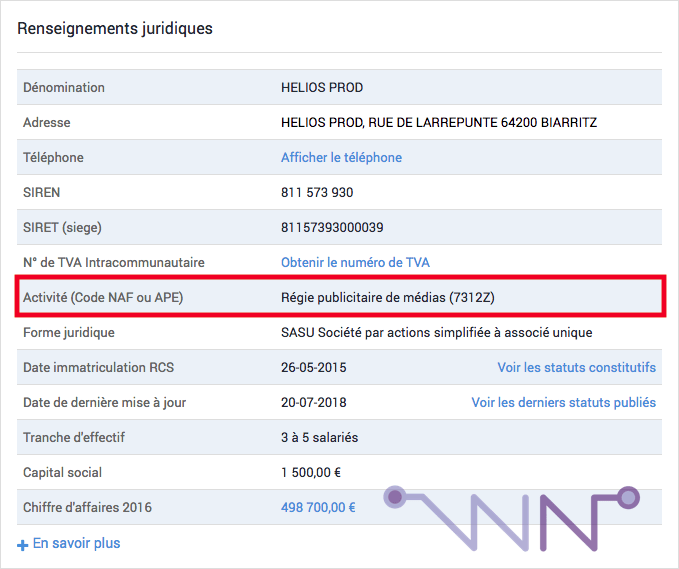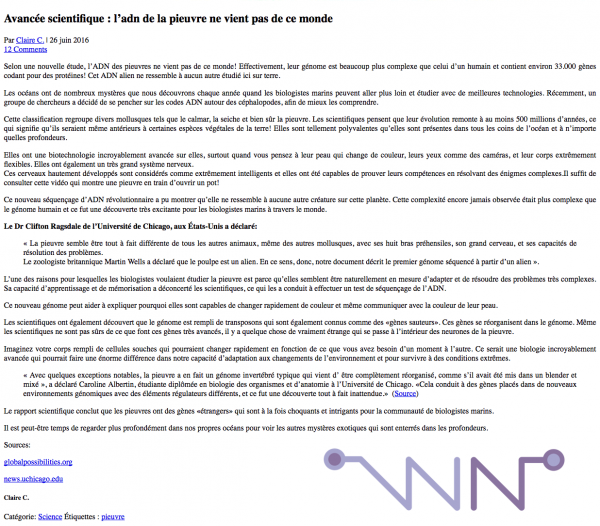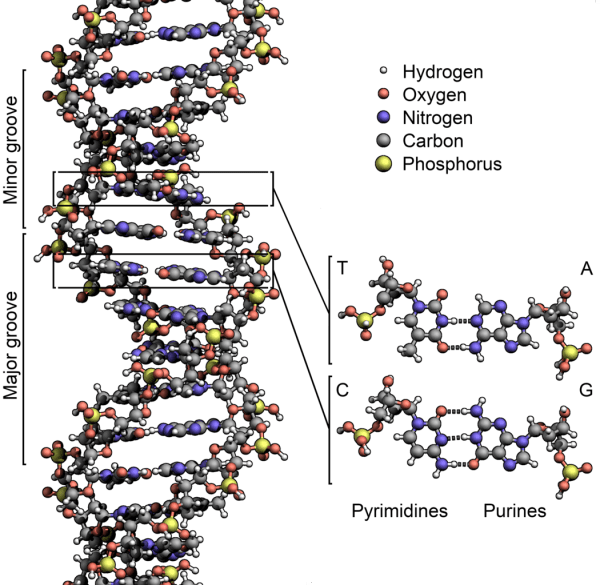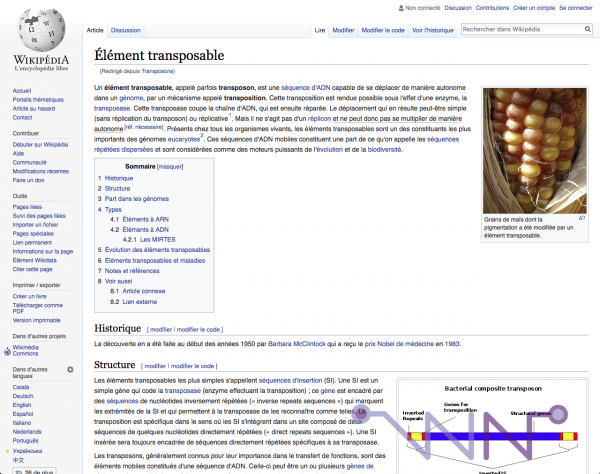Media education : Scientific progress, the octopus DNA does not come from this world
on 16 October 2018
Misinformation on the Internet has become a fashionable subject since the election of the American President at the end of 2016. But this is nothing new: for me, it started in the early 2000s with email chains spreading false information. When my grandmother died, we found in her belongings..... a leaflet from the beginning of 1900.... that spread false information.
So, in recent years, small groups have formed to cope. But it must be understood that this trend is far from over: between "reputable" newspapers that write sensationalist articles (The Parisian, for example), sites that make misinformation under the guise of humour (NordPresse, Le Gorafi,...), sites that make misinformation for militant purposes or those that make it because they believe in a globalized conspiracy theory, there is much reason to write shit on the Internet.
And writing shit on the Internet has become very simple. With the advent of social networks, the tools to make a site without touching a line of code, everyone can speak out, for better or worse. Sometimes, this makes us regret the absence of a PPP (Public Speaking Permit) as presented in the book Virus L.I.V.3 or the Death of the Books.

So, you have to learn to live with it. Understand why there is so much misinformation. And above all, how it finances itself. The business model for free sites is always the same: you have to display advertising. Hence the appearance of ultra-selling titles whose content is completely rotten: the objective is to make you display the page and the associated ads, not to convey information.
A good way to fight misinformation is through boycotts. Does a title seem too catchy to you? Do not click. Or, install an ad (and tracker) blocker to prevent the ad from being displayed. This is a viable solution if -and only if- you unlock ads on the sites you like. They have to post ads to continue, because you like them.
This debunking was initially published in June 2016, on my previous blog. I updated the dead links. It should be noted in particular that the original article was deleted, after very virulent comments below. When a page has been removed from the Internet, have the Wayback Machine reflex (here is the link for the article we are talking about).
We're getting far enough away from the subject of this blog, approaching more the study of conspiracy sites and good big fake news, but it's finally an educational example enough for me to allow myself to republish it here (the major French media are still misinforming in 2018, as we'll see). And so, I rewrote a lot of the debunking, updating it and putting this "fake news" fashion into perspective.
This is once again the opportunity to see how a piece of information from the US press (a joke from a researcher) has become in the French media, the very serious information "it is the first time we see DNA from an alien" (kikoo the Huffingtonpost) then in dubious sites "the octopus is an alien" (like the infamous spiritsciencemetaphysic, even the Parisian in May 2018).
It's sad, it proves once again that advertisers and the click appeal (and the display of ads that make money) often take precedence over the quality of the editorial charter of some journalistic sites.
The original article having been removed from the internet, I have put a copy online for you.
I saw this article in the Zététique group and as I had time to waste, I wrote this review.
On reading this text, I note the ambiguity of the words "world" or "earth", several hypotheses:
- the author voluntarily wishes to write false things, so it is necessary to take them in the first degree ;
- on the contrary, the author is very intelligent and these two terms must be understood as opposed to the expression "aquatic world" (the octopus is not part of this "(terrestrial) world" / "earth").
From this point of view, the article is less false, simply deliberately blurred to make the person click.
An advertising site above all

First, the website (epritsciencemetaphysiques.com) is known to spread false information.
A member of the Zététique group wrote to him: "Espritciencemetaphysique is content to pump information from the US web and translate it into French. With a predilection for everything that is extraordinary and fantastic. There is no sorting or methodology just to post that will attract the shopper and that the French web has not spoken of."
Note that the site is full of advertising: on a smartphone, a full page ad appears, then the title, then again a full page ad. The online press lives on advertising, but there, a sign "this site knows it writes misinformation, so people won't pay for it to survive, so it puts advertising everywhere to finance itself" must light up in your head. It is more an advertising medium (which aims to make money by generating a large number of clicks) than an informative site at this level (the content does not matter to them).
Confirmed by another member of the Zététique group: "This site is well known for telling nonsense most of the time and the question to ask is: Why? The company declared owner of this site is HELIOS PROD (they have since hidden their identity in the WHOIS). It is an advertising company. So the objective of this site is to generate income by attracting Internet users. Indeed, each page contains on average six advertisements displayed and each time a browser is displayed, HELIOS PROD receives money from the advertisers. Hence the more than secondary attention paid to the quality and validity of the published content: the essential thing is to be attractive..."
But let's put that aside, and leave without any a-priori.
Criticism of the content of the article
When sharing on Facebook, you have without clicking:
- the title: "Scientific advancement: the octopus DNA does not come from this world",
- a piece of text: "According to a new study, octopus DNA does not come from this world! Indeed, their genome is much more complex than that of a human being."
With just the title and this piece of text, we can already establish a slightly more scientific reasoning : can I make a simpler hypothesis ? One that doesn't require an alien to explain the complexity of octopus DNA ? Very briefly, the theory of evolution says yes to this question. And in science, in general, the simplest hypothesis is often the one used.

"According to a new study, octopus DNA does not come from this world!"
This information is free and without source. In a scientific document one would expect a parenthesis, referring to the reference of the article that made such a hypothesis. Now... we have to take the author's word for it.
On the other hand, if we consider the meaning of "world" as being "terrestrial world" (the one in which we live), this statement is correct: the octopus is clearly not an animal of the "human" terrestrial world (but of the "aquatic world"), so the statement is just obvious.
"Indeed, their genome is much more complex than that of a human and contains about 33,000 genes encoding proteins! This alien DNA is unlike any other studied here on earth."
Several things :
- octopus DNA contains more genes than human DNA (33,000 vs. 25,000 for humans), that's correct ;
- but more genes doesn't mean "more complexity". Far from it (corn has 54,000 genes, that's it... Source) ;
- However, it is true that octopus has a very complex genome, through the expansion of two specific families of genes (Source) ;
- why would this DNA be "alien"? Again, one would expect a source. We have to take the author's word for it.
As said above, if at the end of the sentence "earth" is understood as "terrestrial world" (as opposed to the underwater world of the octopus), the octopus is indeed an alien (literally "alien" means "foreigner": source) of this "terrestrial" world.

"The oceans have many mysteries that we discover every year when marine biologists can go further and study with better technologies. Recently, a group of researchers decided to look at the DNA codes around cephalopods in order to better understand them."
This statement is perfectly true. A little truth helps to convey the false message that comes next.
Even if the expression "DNA codes" does not exist. We speak of "genetic code" (an assembly of three nucleotides that will be translated into an amino acid -Source-) or just DNA (abbreviation of "deoxyribonucleic acid" that refers to its composition -Source-). And "DNA codes around cephalopods", WTF ? The less false wording would be "the DNA code of cephalopods". So clearly, the author is not a biologist and therefore not a specialist in the field on which she is writing this article (she can therefore make mistakes).
"This classification includes various molluscs such as squid, cuttlefish and of course octopus. Scientists believe that their evolution dates back at least 500 million years, which means that they would even predate some of the earth's plant species! They are so versatile that they are present in all corners of the ocean and at any depth."
These sentences are very interesting because two truths surround a lie.
The first sentence is correct.
The second one is worth a look :
- that the octopus appeared 500 million years ago... why not.
- that it predates some of the earth's plant species... why not. In my opinion, they did not yet have a purple rose with bluish highlights at the time. On the other hand, "earth" must not be understood as "the planet Earth", where life appeared in the oceans 3,800 million years ago with cyanobacteria (Source).
For the third sentence, since we are far from having explored all the oceans, this is only a hypothesis: we really haven't searched all over the ocean. Even rather than a very small superficial part.
"They have incredibly advanced biotechnology on them, especially when you think of their changing skin colors, their eyes like cameras, and their extremely flexible bodies. They also have a very large nervous system."
Here too, it plays on the "wow" effect. Chameleons can change color, the eagle has a great view (and the underwater view is not really important, it's more an aerial sense, so land animals...), the slug has a super flexible body..... in short, examples of animals "super wahou", there is a shovel.
Note the comparison "eyes like cameras": the human eye is nowadays much more powerful than a camera, especially in low light (which is the norm in the oceans)... think of your smartphones.

The reference to a "very large nervous system" raises two issues:
- there is no element of comparison (I suspect the giraffe has a larger nervous system than an octopus... as it is much larger),
- a large nervous system does not presume at all of its efficiency/complexity,
- ... in short, the sentence is useless.
We can also note here the "incredibly" value judgment that we find throughout the article: it is not scientific, it just serves to create the "wow effect".
"These highly developed brains are considered extremely intelligent and have been able to prove their skills by solving complex puzzles. Just look at this video that shows an octopus opening a jar!"
That the octopus is intelligent is a fact. Yes.
That the brain is "highly developed": in relation to what ? The human brain is probably more so with its prefrontal cortex, which has allowed the emergence of human technological civilization. When we were talking about value judgments....
That the octopus is able to open a jar, yes, indeed. There are many intelligences capacities in the animal world. Really, a lot. So it's ordinary, not extraordinary.
"This revolutionary new DNA sequencing may have shown that it looks like no other creature on this planet. This complexity, never before observed, was more complex than the human genome and it was a very exciting discovery for marine biologists around the world."
So the sequencing is "new" because we just did it. But it was carried out using standard laboratory sequencing techniques. Again a value judgment: I don't see how this DNA is revolutionary. It is composed like any other DNA, so it is a deoxyribonucleic acid if you have followed it correctly.
The fact that it doesn't look like any creature, well, actually, it's not true. Just, wrong.
For the end, you can imagine: under no circumstances is this complexity extraordinary and in my opinion, the author really doesn't know what marine biologists think. Do you remember that ? We saw that she was not an expert in the field.
"Dr. Clifton Ragsdale of the University of Chicago, USA, said: "The octopus seems to be quite different from all other animals, even other molluscs, with its eight prehensil arms, large brain, and problem-solving abilities. British zoologist Martin Wells has stated that octopus is an alien. In this sense, therefore, our document describes the first genome sequenced from an alien."
We are dealing here with what is called an argument of authority. The site quotes a scientist (who probably exists) hoping that since he is a "Doctor" at a university, you will not question his words: question them.
In the original text, this reads: "It's the first sequenced genome from something like an alien," jokes neurobiologist Clifton Ragsdale. He was kidding, huh. Was doing a joke => lol.
(It should be noted that poor Martin Wells did not ask for anything. Source).

"One of the reasons biologists wanted to study octopus is because they seem to be naturally able to adapt and solve very complex problems. His ability to learn and memorize confused scientists, which led them to perform a DNA sequencing test."
The beginning, yes, the end... to test learning / memorization, behavioral tests are performed first, before sequencing the DNA. There is really not necessarily a DNA link => behavior. Far from it.
Instead, DNA is sequenced to study proteins, or the classification of living species (and that's outdated, as an approach).
"This new genome can help explain why they are able to change color quickly and even communicate with the colour of their skin."
Yes, but it's not extraordinary.
It is obvious that their ability to change color depends on their genes: at first, we were only an egg cell composed of DNA and by dividing, we obtain an adult individual.
On the other hand, we will note the "communicating with the color of their skin": do you often communicate with the color of your skin ? What does this expression mean ? (Probably the idea that they are aware of their current color, to change and adapt it, but it is very poorly written and the term "communication" is very precise in biology -some keys to what "communication" is: Wikipedia which has done a good job-).

"Scientists have also discovered that the genome is full of transposons that are also known as "jumping genes". These genes are reorganized in the genome. Even scientists are not sure what these very advanced genes are doing, there is something really strange happening inside the neurons of the octopus."
Transposons do exist, they are not magical. Everyone has them (Source).
They cannot "reorganize" as if a divine will was guiding them, eh.
We will also note the value judgment "very advanced genes". A gene is a gene, a DNA fragment: one gene cannot be more advanced than another.
And the link between "transposons" and "neurons"? She goes from rooster to donkey. As the human mind fills the gaps in itself, it must expect us to think that it is because these "magic transposons" are in the genome, that octopuses are intelligent... but it is completely false and gratuitous as reasoning.
"Imagine your body filled with stem cells that could change quickly depending on what you need at any given time. It would be an incredibly advanced biology that could make a huge difference in our ability to adapt to environmental changes and survive extreme conditions."
So, too many stem cells can be bad for an organism. We need stability (to preserve our memory, for example, childhood amnesia would be based on significant stem cell death in the brain, necessary for adult emergence). Here we are once again in this idea of a divine will that would guide stem cells to the right place, at the right time... that's not how biology works.
And so far, our rather "bad" biology compared to other physically much stronger animals (such as the cat that falls several floors without dying) has not prevented us from becoming the dominant species on the planet.
Did you notice the value judgment on "incredibly advanced biology"?
""With some notable exceptions, the octopus has in fact a typical invertebrate genome that has just been completely reorganized, as if it had been put in a blender and mixed," said Caroline Albertin, a graduate student in organism biology and anatomy at the University of Chicago. " This leads to genes placed in new genomic environments with different regulatory elements, and it was a completely unexpected discovery." (Source)"
Yes. Why not. Its genome has a particular organization. Just like viruses that are not based on DNA, but on RNA. This lady has every right to say that!
You can see the authority argument a little bit there, can't you ? We will see how the author of this site will distort these very valid words now.
"The scientific report concludes that octopuses have "foreign" genes that are both shocking and intriguing to the marine biology community."
Above, the site sources the quote from C. Albertin: but there, no source. So we have to take the author at her word and... well, nop.
Octopi have no foreign genes, no no. And you see the judgment on "shocking" ?
She completely distorts C. Albertin's thesis here, we call it the scarecrow argument: to misinterpret an affirmation of her interlocutor to make him say what we want (generally, to support the fact that we are right).

"Perhaps it's time to look deeper into our own oceans to see the other exotic mysteries that are buried in the depths."
Ah... indeed. Ask the French government to stop cutting our research grants for this.
“Sources: globalpossibilities.org and news.uchicago.edu”
globalpossibilities.org => This is the original version of the article in English, where the comments basically say "the original scientific study doesn't say that at all, you say shit, you're not credible, shame on you".
news.uchicago.edu => another one that looks more scientific to me and describes the scientific paper more honestly. Article entitled "Landmark sequencing of octopus genome shows basis for intelligence, camouflage", it's less selling, yes.
“Claire C.”
She dared to sign this rag, yes, yes, yes!!!
To conclude
My post was written more than two years ago, so we know more about the end of the story.

Let's look at the chronology :
- The original scientific article, published in Nature in August 2015, established the first sequencing of octopus DNA. It's a very beautiful paper. Nature remains a journal where many scientists would like to publish. It's prestigious ;
- There is no mention of the word "alien" in this scientific article ;
- Except that there he was, the researcher, joking in the American media the next day, saying it was alien DNA. BAM! Media coverage, we still laugh about it three years later, lol.
- The French media then confused the scientific article with the American journalistic article and began to headline "Octopuses are aliens (science says !)" (like here, which means they didn't even read the original scientific article, so they didn't go back to the source).
That was at the time of my debunking in 2016, but since then, the real joke is elsewhere (no, not in the stars).
Indeed, by updating this article, I discovered that the joke was still going on.
Because 500 million years ago and for more than 10 million years, there was an "explosion of life" on Earth, leading to a sudden and unprecedented diversification of species. As a result, a group of 33 researchers suggested (in May 2018) that these are extraterrestrial viruses at the root of this..... even octopus eggs sent by small green men through comets (we saw above that the octopus appeared at that time). No kidding, it is written in the publication: "Thus the possibility that cryopreserved Squid and/or Octopus eggs, arrived in icy bolides several hundred million years ago should not be discounted".
The good news is that they did not publish in Nature (impact factor of 41.6, as explained in my previous article) but in Progress in Biophysics and Molecular Biology which has an impact factor of only..... 3.4. So a much less rated journal, which obviously does not mind publishing papers with eccentric theories.
Let us understand each other. Regarding the first article of 2015, the media have no excuse for their mistake. On the other hand, in 2018, the subject "octopus and extraterrestrial" can be treated by the media: this is a hypothesis of the scientific study. What I regret is that rather than taking advantage of this opportunity to educate people about science (how scientific publishing works, the debates that animate our community, the different theories...), the media jump at the opportunity to make clickbait. I explained the architecture of a scientific article in my previous article: you know that the interpretation comes at the end of the article. Here, the media, they make the headlines and completely reverse the initial discourse. And that's the big problem. Science is treated in reverse, despite any scientific method and more broadly, with a critical mind.
In Science, researchers also sometimes want to have fun: just like Pikachurin, the protein that bears the name of the famous Pokemon. We can talk about it in the media, but let them take advantage of it to do a little culture / information, not just disinformation....
We're still in trouble for the future........
Did you like this article? Then support the blog and share it with your friends by clicking on the buttons* below :
Article url :
http://en.chaussenot.net/education-aux-medias-avancee-scientifique-l-adn-de-la-pieuvre-ne-vient-pas-de-ce-monde
* These sharing buttons are respectful of your privacy and avoid tracking by social networks.



